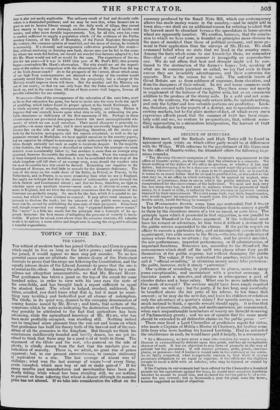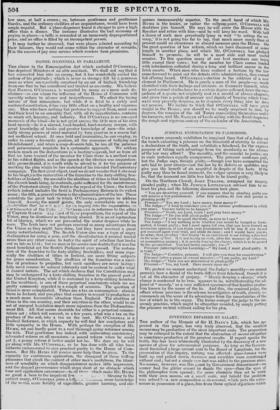DEFENCE OF SINECURES.
Extremes meet, and the Radicals and High Tories will be found in agreement upon points on which either party woulil be at differences with the Whigs. With reference to the appointment of Mr. GREGSON to the office of Gazette-writer, the Standard offers the following: ingenious remarks.
" The Morning Chronicle complains of Mr. Greison's appointment to the office of Gazette-writer, on the ground that the situation is a sinecure. We know nothing of the duties of the office in question, or whether it has any duties ; but assuming it to be a sinecure—we must resist the principle of the Morning Chronicle's objection. If a man is to he provided for, or rewarded, it seems to us much better that he should be provided for, or rewarded as the case may be, in an office in which nothing is to be marred by neglect, misconduct, or Ignorance, than in one in which the public interests are to be compromised for the convenience of the individual. We need not look very far, nor stoop very low, to find men in stations where the payment of their salary, be it much or little, is infinitely the least irksome or injurious burden imposed by their appointment. We could name high, yen, high, functionaries, who would impose an inestimable benefit upon the public by retiring with double salary, could the thing be managed."
The Wvotininster Buview some time ago contended, that it woew be far better to pension the Country Gentlemen than to convey a profit to them by the circuitous means of a tax on bread, or corn laws. The principle upon which it proceeded in that suggestion, is one parallel to that of the Standard in the above argument. If the individual must have his reward or advantage, let him have it without a detriment to the public service superadded to the charge. If the public require an officer to execute a particular duty, mid an incompetent person fills the appointment, two evils accrue to the Slat e,—the one, the application of money 'where there is no return ; tlai other, and far greater mischief, the non-performance, imperfect performance, or ill administration, of important functions. Sinecures are, according to the Standard, the conveniences which draft off the unfit into places where they profit themselves at the public expense, but without damaging the public service. The vulgar, if they understood the practice, woidd be apt to call it "official swindling," or obtaining money under false pretences: the polite, however, style it simply "patronage.' / Our system of rewarding, by preferment to places, seems in many :cases exceptionable, and inconsistent with a prudent economy. A barrister assists a minister, and obtains in consequence a post of ;.slender duties and a large salary. What can be more indefinite than fl his mode of reward ? The services might have been amply requited for 2,000/. we will say; but the party, if he live long, may eventually be benefited above the fair price of his labour, to ten limes that amount ; or he may die the next day, and leave his children or relatives only the advantage of a quarter's salary ! For specific services, we are much inclined to think, a specific reward should apply. it is thus that :authors of inventions, chemists, and mathematicians, are remunerated, when such unquestionable benefactors of society are thought deserving of Parliamentary grants ; and we are of opinion that the same mode should be extended to all defineable claims on the public purse. ------
There once lived a Lord Chancellor of prodigious repute for virtue, who made a Captain of Militia a Master in Chancery, for beating some little boys who were hooting his learned Lordship. Had he rewarded the interference in cash, he would have paid it largely, to a mercenary*
By a Mercenary, we here mean a man who receives his wages in money. Honour is extraordinarily delicate upon this point, and has an inexplicable shyness of cash. It has no objection to any form of property in the way of present but the pecuniary. It will receive pictures, plate, jewels, sinecure !-.• places, or pensions—but it loathes a round sum in the currency of the realm. As we lately remarked, what is especially curious is, that while it scorns pecuniary obligation to an equal or superior, it has often not the slightest scruple to incur a debt with an inferior, wino may be injured or ruined by the loss.
If the Captain in our example had been offered by the Chancellor a hundred pounds for his operations against the boys, he would have asked his Lordship whether he meant to insult him, and declared his service not to be of a elmracter for any reward; but as thousands a year for place were the terms, honour suggested no kind of objection. low man, at half a crown; or, between gentleman and gentleman thanks, and the ordinary civilities of an acquaintance, would have been ample requital. But a place-dispenser found it cheaper to give a high office than a dinner. The instance illustrates the bad economy of paying in places—a trifle is rewarded at an immensely disproportioned price, and an office is filled by an incompetent person. It may further be observed, that were places salaried according to heir labours, they would not come within the character of rewards. It is the excess of pay over service which renders them premiums.



















 Previous page
Previous page